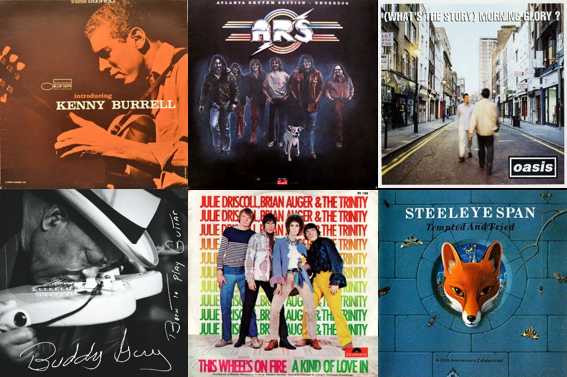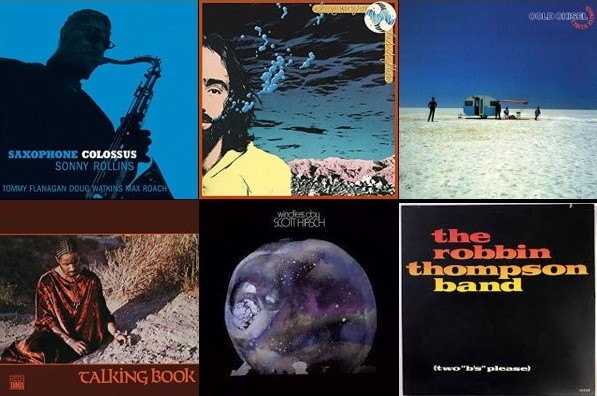I hope you’ve had a good week and would like to welcome you to another installment of The Sunday Six. Once again, I’ve put together an itinerary that will take us to music from different genres released in six different decades.
Kenny Burrell/Weaver of Dreams
Today, we start in September 1956 when American jazz guitarist Kenny Burrell released the first album under his name, appropriately titled Introducing Kenny Burrell. Burrell’s recording debut occurred five years earlier, as a 20-year-old in Dizzy Gillespie’s sextet while studying at Wayne State University. Apart from releasing a large volume of albums as a leader, Burrell recorded and performed as a sideman with Jimmy Smith, Stanley Turrentine, Johnny Hodges and many others. Weaver of Dreams, co-written by Jack Elliott and Victor Young, is a beautiful track to ease us into the trip. Burrell was backed by Tommy Flanagan (piano), Paul Chambers (bass) and Kenny Clarke (drums).
Atlanta Rhythm Section/Spooky
Next, let’s jump to June 1979 and a really cool song I was reminded of just the other day: Spooky, from the eighth studio album Underdog by southern rockers Atlanta Rhythm Section. Spooky’s origin is a 1967 instrumental composed by saxophonist Mike Shapiro and Harry Middlebrooks Jr. Later that year, Florida soft rock band Classics IV released a version with lyrics. Classics IV keyboarder Dean Daughtry and and the group’s guitarist J. R. Cobb subsequently co-founded Atlanta Rhythm Section in 1970. Not only did they include what became the song’s best-known version on the above album, but also released it separately as the second single in August 1979.
Oasis/Some Might Say
Time to pay a visit to the ’90s and one of the biggest alternative rock bands of that decade: Britain’s Oasis who were formed in Manchester in 1991. Their critically acclaimed and commercially successful August 1994 debut album Definitely Maybe was followed by (What’s the Story) Morning Glory? in October 1995. While critics initially were lukewarm, it became one of the best-selling albums of all time with more than 22 million copies sold worldwide. Some Might Say, who cares about the critics!
Buddy Guy/Born to Play Guitar
If there’s one blues guitarist who seemingly was born to do what he does, it’s Buddy Guy. And he put it all in words and sound on the title tack of his 17th studio album Born to Play Guitar, which came out in July 2015. When you see Guy perform live, which I’ve been fortunate to have experienced three times over the past eight years, most recently in April 2022, you get the sense it’s about more than just playing the geetar; it’s about a mission to keep the blues alive. Now 87, Guy is currently on his Damn Right Farewell Tour.
Julie Driscoll, Brian Auger and The Trinity/This Wheel’s On Fire
As frequent travelers on the Sunday Six music time machine know, there can be no such excursion without a stop in the ’60s. This next destination was another great suggestion by my longtime German music friend Gerd. In April 1968, English singer and actress Julie Driscoll and British group Brian Auger and The Trinity released psychedelic gem This Wheel’s On Fire as a single. Co-written by Bob Dylan and Rick Danko, the song was originally recorded by Dylan and The Band in 1967. Dylan eventually released it in June 1975 on his album The Basement Tapes.
Steeleye Span/Jack Hall
This leaves us with the sixth and final stop. To wrap up, we shall travel to September 1989, which saw the release of Tempted and Tried, the 13th studio album by British folk rock band Steeleye Span. After releasing 10 albums in rapid succession between 1970 and 1977, the group significantly slowed down the pace. Tempted and Tried only was their third album that appeared since 1977. Jack Hall, a traditional English folk song from the early 18th century, was arranged by the band’s vocalist and guitarist Bob Johnson. Steeleye Span remain active to this day with one original member (Maddy Prior) in their current line-up.
This post wouldn’t be complete without a Spotify playlist of the above tracks. As always, I hope there’s something that tickles your fancy and you’ll be back for more.
Sources: Wikipedia; YouTube; Spotify



